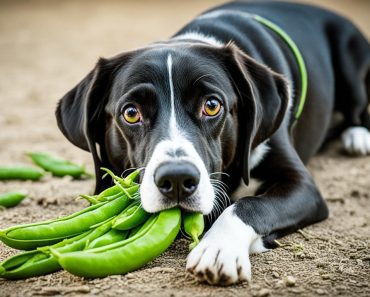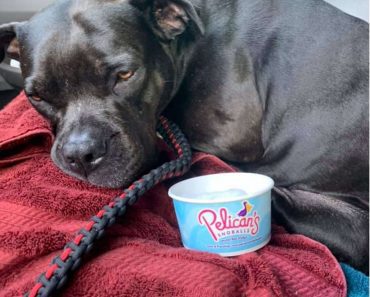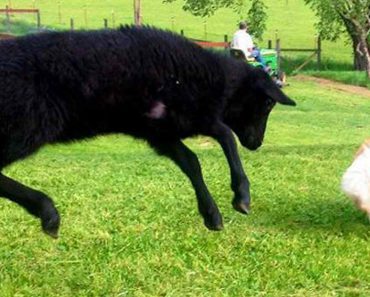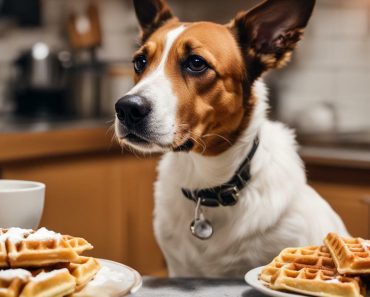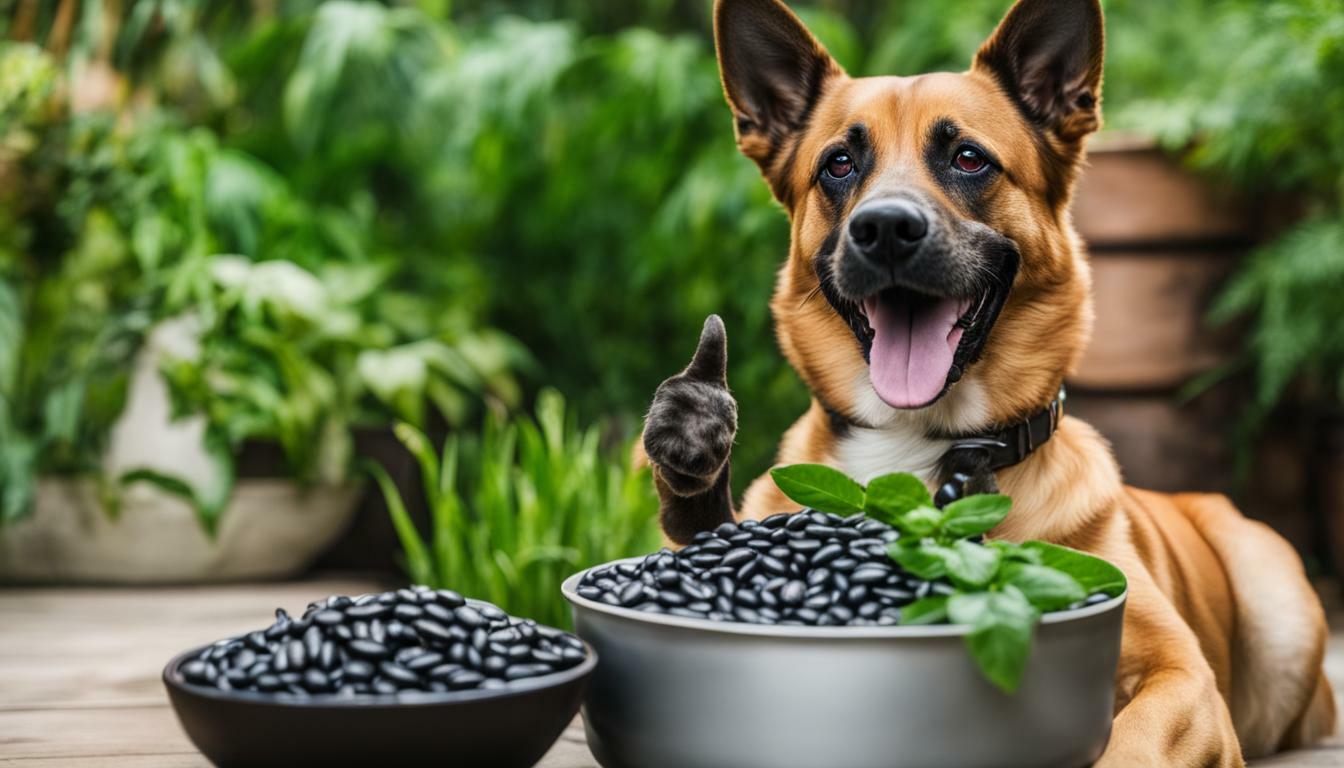
Have you ever wondered if it’s safe for your furry friend to indulge in delicious black beans? In this comprehensive pet nutrition guide, we’ll explore whether dogs can eat black beans and how to incorporate them into their diet safely.
Key Takeaways:
- Black beans can be safe for dogs to eat, but they should be fed in moderation and prepared properly.
- They are a good source of protein, fiber, and antioxidants.
- Soak and cook black beans thoroughly to remove toxins before feeding them to your dog.
- Avoid canned black beans due to their high sodium content.
- Other safe beans for dogs to eat include green beans, lima beans, pinto beans, and chickpeas.
- Always consult with your veterinarian before adding any new food to your dog’s diet.
Benefits of Feeding Black Beans to Dogs
Black beans aren’t just a tasty addition to human meals – they can also provide several benefits to our canine companions. These legumes are packed with essential nutrients that can support your dog’s overall health. Here are some of the key benefits of feeding black beans to dogs:
- Protein: Black beans are an excellent source of plant-based protein. Protein is essential for muscle growth and repair, and it plays a crucial role in maintaining your dog’s overall health and vitality.
- Fiber: Black beans are rich in dietary fiber, which can promote healthy digestion and regulate bowel movements. Adequate fiber intake can help prevent constipation and promote a healthy gut.
- Antioxidants: Black beans are loaded with antioxidants that can help protect your dog’s cells from damage caused by harmful free radicals. Antioxidants also support a strong immune system and may reduce the risk of chronic diseases.
When incorporating black beans into your dog’s diet, it is important to remember a few key points. First, moderation is key. While black beans can provide numerous benefits, they should be fed in moderation as part of a balanced diet. Too many beans can cause digestive upset in some dogs.
Additionally, proper preparation is crucial. Before serving black beans to your pup, soak and cook them thoroughly to remove any toxins. Uncooked or improperly prepared black beans can contain harmful substances that can be toxic to dogs. It is best to avoid canned black beans due to their high sodium content.
Lastly, it is worth mentioning that black beans are not the only safe option when it comes to feeding beans to dogs. Other beans, such as green beans, lima beans, pinto beans, and chickpeas, can also be included in your dog’s diet to provide similar nutritional benefits.
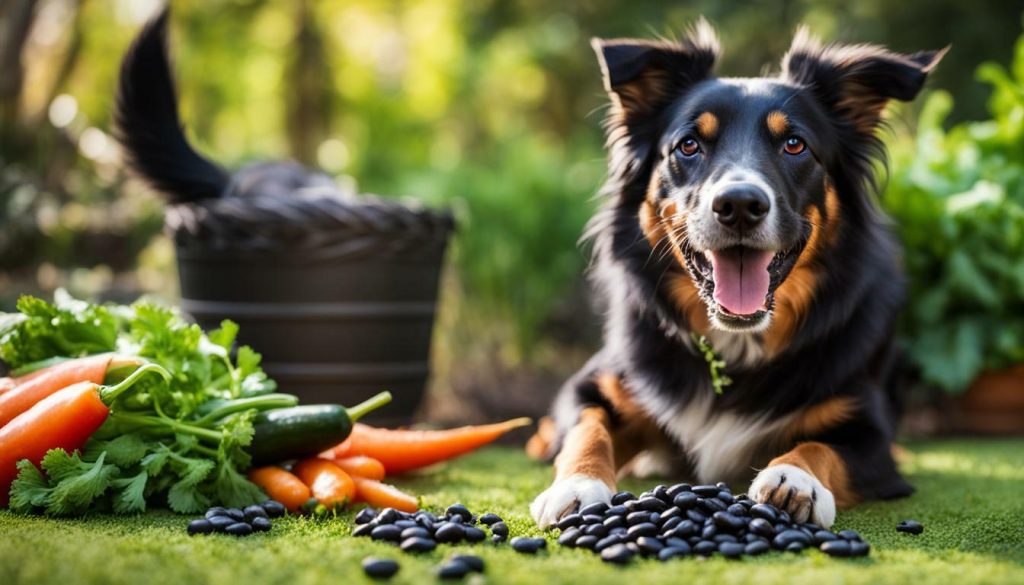
| Benefits of Feeding Black Beans to Dogs | Key Points |
|---|---|
| Protein | Supports muscle growth and repair. |
| Fiber | Promotes healthy digestion and regulates bowel movements. |
| Antioxidants | Protects cells from damage and supports a strong immune system. |
How to Properly Prepare Black Beans for Dogs
To ensure your dog can safely enjoy black beans, it’s essential to know how to properly prepare them. Black beans are a nutritious food for dogs, but they contain toxins that can be harmful if not removed through thorough soaking and cooking. Here is a step-by-step guide on how to prepare black beans for your furry friend:
- Soak the beans: Start by rinsing the black beans under cold water to remove any dirt or debris. Then, place them in a large bowl and cover with water. Let the beans soak overnight or for at least 8 hours. This helps to soften the beans and remove some of the indigestible sugars that can cause gas in dogs.
- Cook the beans: Drain the soaked beans and transfer them to a pot. Add fresh water to the pot, making sure it covers the beans by at least 2 inches. Bring the water to a boil, then reduce the heat and let the beans simmer for about 1-2 hours or until they are soft. Cooking times may vary, so it’s important to check them regularly to avoid overcooking.
- Remove any toxins: During the cooking process, some toxins in the beans may be released into the water. To further reduce the toxin content, it’s recommended to drain and rinse the beans after cooking. This step helps to remove any remaining toxins and excess sodium, especially if you’re using canned black beans.
Once the black beans are properly prepared, you can serve them to your dog as a part of a balanced diet. It’s important to remember that moderation is key. Too many black beans can cause digestive upset in dogs, so it’s best to introduce them gradually and monitor your pet’s response. Consult with your veterinarian to determine the appropriate portion size and frequency of feeding black beans to your dog.

| Benefits of Properly Prepared Black Beans for Dogs |
|---|
| Rich in protein for muscle development and maintenance. |
| Good source of fiber to support healthy digestion. |
| Contain antioxidants that can help boost your dog’s immune system. |
| Low in calories, making them a great addition to a weight management plan. |
By following these steps and practicing moderation, you can safely incorporate black beans into your dog’s diet. However, if you have any concerns or questions about feeding black beans to your dog, it’s always best to seek the advice of your veterinarian. They can provide personalized guidance based on your dog’s specific nutritional needs and health conditions.
Black Beans as a Source of Protein for Dogs
Protein is an essential nutrient for dogs, and black beans can be a surprisingly good source of this vital component. They contain approximately 21 grams of protein per 100 grams, making them a valuable addition to a dog’s diet. Protein is necessary for building and repairing tissues, supporting the immune system, and maintaining proper growth and development.
In addition to protein, black beans also offer other nutritional benefits. They are rich in fiber, promoting healthy digestion and aiding in weight management. Black beans are also packed with antioxidants, which help protect the body against free radicals and inflammation. These important nutrients contribute to overall health and well-being in dogs.
| Nutrient | Amount per 100g |
|---|---|
| Protein | 21g |
| Fiber | 16g |
| Antioxidants | Varies |
When feeding black beans to your dog, it’s important to prepare them properly. Soak dried black beans overnight to remove any toxins, then cook them thoroughly before serving. This ensures that the beans are safe for consumption and prevents any potential digestive upset.
While black beans can be a valuable source of protein for dogs, it’s essential to feed them in moderation. Too many beans can lead to gastrointestinal issues, such as gas or bloating. It’s always best to introduce new foods gradually and observe how your dog’s body reacts to them.
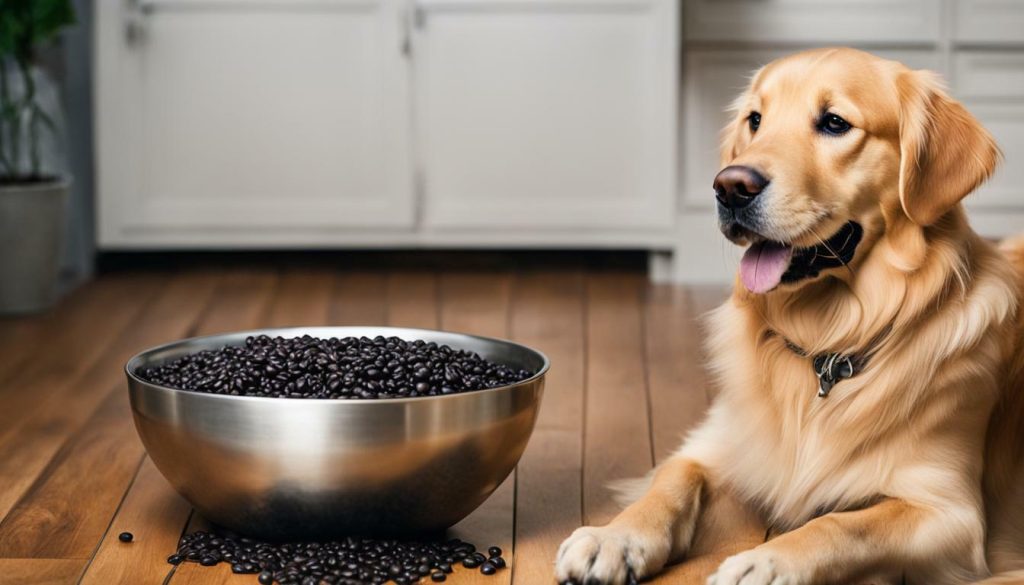
Other Safe Beans for Dogs to Eat
In addition to black beans, several other beans are safe and beneficial for dogs to consume. Green beans, for example, are low in calories and high in fiber, making them an excellent choice for weight management. Lima beans are a good source of protein and contain essential minerals like potassium and magnesium. Pinto beans offer a range of nutrients, including protein, fiber, iron, and folate. Chickpeas, also known as garbanzo beans, are rich in protein and fiber, supporting digestive health in dogs.
However, it’s important to note that not all beans are safe for dogs. Some varieties, such as kidney beans and red beans, contain toxins that can be harmful to dogs if not properly prepared. Always consult with your veterinarian before adding any new food to your dog’s diet to ensure their safety and well-being.
Potential Risks of Feeding Black Beans to Dogs
While black beans can provide benefits, it’s important to be aware of the potential risks involved in feeding them to dogs. Black beans contain a substance called lectin, which can be toxic to dogs if consumed in large quantities. Lectins can cause gastrointestinal upset, including vomiting and diarrhea, and can also interfere with nutrient absorption in dogs.
Another potential risk of feeding black beans to dogs is the presence of phytates. Phytates are compounds that can inhibit the absorption of certain minerals, such as calcium and iron, in a dog’s digestive system. If a dog consumes large amounts of black beans on a regular basis, it could lead to nutrient deficiencies over time.
It is also important to note that canned black beans should be avoided when feeding dogs. Canned beans often contain high amounts of sodium, which can be harmful to dogs and contribute to health issues like hypertension and kidney problems. It is always best to cook black beans from scratch and avoid any added seasonings or ingredients that may be harmful to dogs.
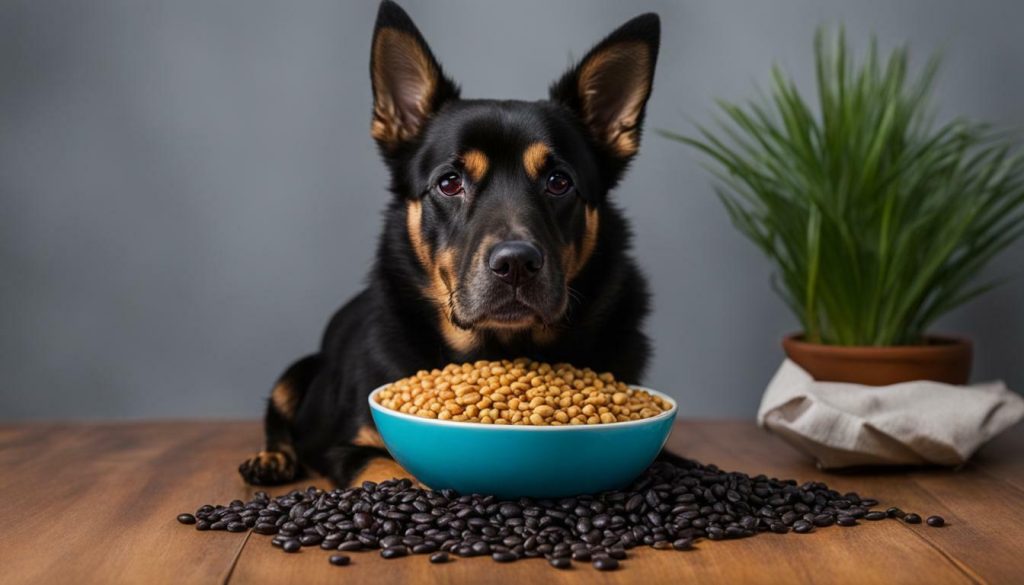
| Potential Risks | Consequences |
|---|---|
| Lectin Toxicity | Gastrointestinal upset, vomiting, diarrhea |
| Phytates | Inhibition of mineral absorption, nutrient deficiencies |
| Sodium Content in Canned Beans | Hypertension, kidney problems |
As with any new food, it’s essential to introduce black beans to your dog’s diet gradually and in moderation. Start with small amounts to see how your dog reacts, and monitor their digestion and overall well-being. If you notice any adverse reactions or digestive issues, it’s best to discontinue feeding black beans and consult with your veterinarian.
Remember that black beans should not be the main source of protein for your dog. While they do contain protein, it is important to provide a balanced and varied diet that includes other sources of high-quality protein. Consult with your veterinarian to ensure your dog’s dietary needs are met in the most beneficial and safe way.
Alternative Food Options for Dogs Besides Black Beans
If black beans aren’t suitable for your dog, there are plenty of alternative food options that can provide similar benefits. These alternatives can ensure your furry friend gets a well-rounded and nutritious diet. Here are some safe and nutritious alternatives to black beans that you can consider:
- Green Beans: Green beans are low in calories and high in fiber, making them a great option for dogs who need to lose weight or have digestive issues. They can be served steamed, boiled, or even raw as a crunchy snack.
- Lima Beans: Lima beans are packed with protein, fiber, and essential vitamins. They can be cooked and mashed to create a healthy addition to your dog’s meal.
- Pinto Beans: Pinto beans are rich in fiber and protein. They can be cooked and mashed or added to your dog’s meals as a nutritious filler.
- Chickpeas: Chickpeas are a great source of protein and fiber. They can be cooked and mashed or even roasted as a crunchy snack for your dog.
When incorporating these alternatives into your dog’s diet, it’s important to introduce them gradually and monitor their reaction. Also, remember to cook any beans thoroughly to ensure they are easy for your dog to digest. As with any new food, it’s always best to consult with your veterinarian before making any major changes to your dog’s diet.
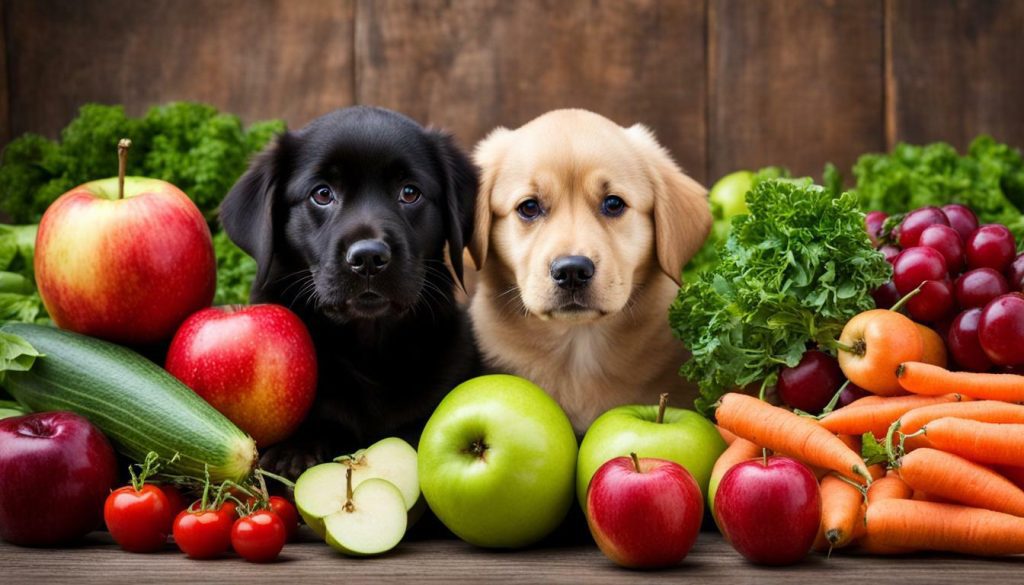
Table: Nutritional Comparison of Black Beans and Alternative Beans
| Bean Type | Protein | Fiber | Vitamins | Minerals |
|---|---|---|---|---|
| Black Beans | 15g | 15g | Vitamin A, B6, C | Iron, Magnesium, Potassium |
| Green Beans | 2g | 4g | Vitamin A, C, K | Calcium, Iron, Potassium |
| Lima Beans | 7g | 13g | Vitamin B1, B6, C | Iron, Magnesium, Potassium |
| Pinto Beans | 15g | 15g | Vitamin B1, B6, E | Iron, Magnesium, Potassium |
| Chickpeas | 19g | 12g | Vitamin B6, C, E | Iron, Magnesium, Potassium |
Table: Nutritional information is per 100g serving.
By diversifying your dog’s diet with alternative beans, you can provide them with a range of essential nutrients to support their overall health and well-being. Remember to always consult with your veterinarian to ensure the best diet for your furry friend.
Can Dogs Digest Black Beans?
Before introducing black beans into your dog’s diet, it’s important to understand if their digestive system can handle them. While black beans can provide nutritional benefits, dogs may have difficulty digesting them properly.
Dogs have a shorter digestive tract compared to humans, which means they have a harder time breaking down complex carbohydrates found in foods like black beans. This can lead to gastrointestinal issues such as indigestion, gas, or even diarrhea. It is important to prepare black beans properly to make them easier for dogs to digest.
| Properly Preparing Black Beans for Dogs |
|---|
|
While black beans can be included in a dog’s diet, it should be done in moderation. Too many black beans can cause digestive upset and potentially lead to obesity. It is always best to consult with your veterinarian before adding any new food to your dog’s diet to ensure it is safe and appropriate for their individual needs.
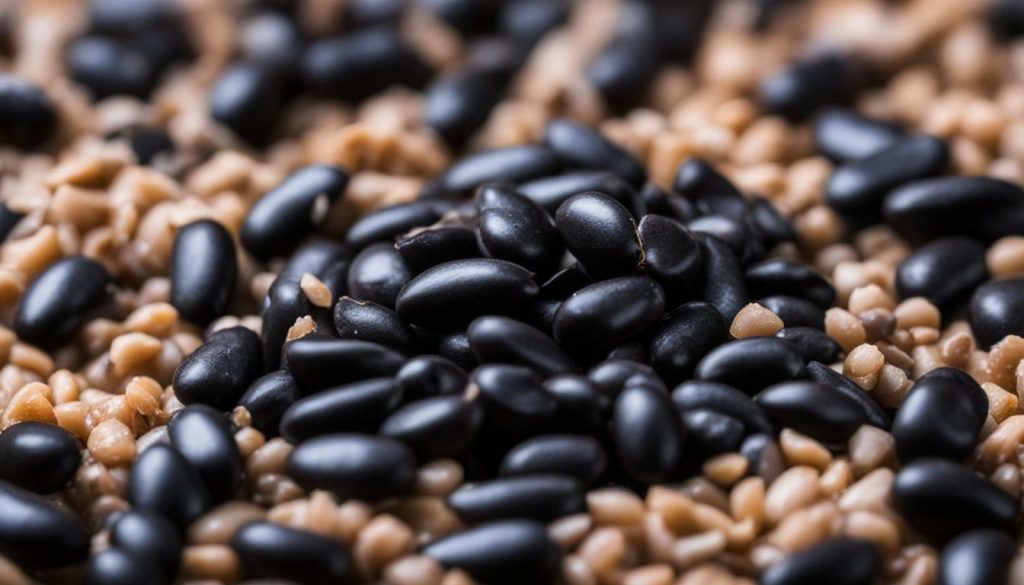
Conclusion:
Black beans can be safe for dogs to eat, but their digestion and preparation should be taken into consideration. If you choose to feed black beans to your dog, make sure to soak and cook them properly, as well as serving them in moderation. Consult with your veterinarian to ensure that black beans are suitable for your dog’s diet and to address any specific concerns or questions you may have.
Nutritional Value of Black Beans for Dogs
Let’s take a closer look at the nutritional content of black beans and how it can benefit your dog’s overall health. Black beans are packed with essential nutrients that can support your furry friend’s well-being when fed in moderation and prepared properly.
Black beans are an excellent source of protein for dogs, which is essential for muscle growth, repair, and overall development. They also provide a good amount of dietary fiber, promoting healthy digestion and bowel movements. Additionally, black beans contain antioxidants that can help boost your dog’s immune system and protect against cell damage.
| Nutrient | Amount per 100g |
|---|---|
| Protein | 21.6g |
| Fiber | 16.5g |
| Iron | 3.6mg |
| Magnesium | 171mg |
| Vitamin B6 | 0.4mg |
It’s important to note that black beans also contain toxins called lectins, which can be harmful to your dog if not properly prepared. Soaking and cooking black beans thoroughly is crucial to remove these toxins and ensure they are safe for consumption. Avoid feeding your dog canned black beans, as they often contain a high amount of sodium, which can lead to dehydration and other health issues.
If you’re looking for alternative bean options for your dog, you can consider green beans, lima beans, pinto beans, or chickpeas. These beans offer similar nutritional benefits and can be prepared and served in a safe manner for your furry friend.
Before introducing any new food to your dog’s diet, it’s always best to consult with your veterinarian. They can provide tailored advice based on your dog’s specific needs and help you make informed decisions about their nutrition.
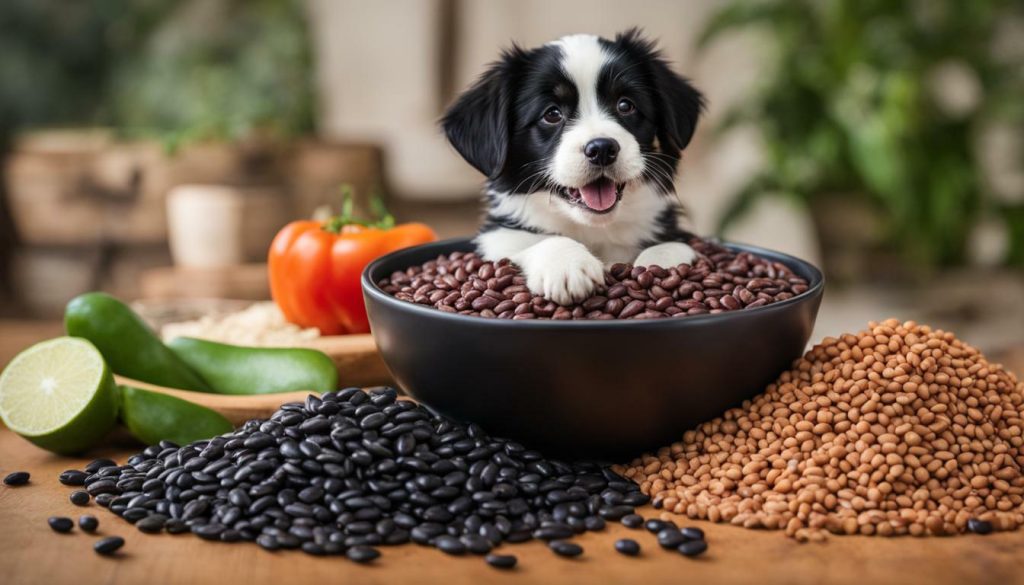
In Summary
- Black beans can be safe for dogs to eat when prepared properly and fed in moderation.
- They are a good source of protein, fiber, and antioxidants, supporting your dog’s overall health.
- Soak and cook black beans thoroughly to remove toxins, and avoid canned black beans due to their high sodium content.
- Other safe bean options for dogs include green beans, lima beans, pinto beans, and chickpeas.
- Always consult with your veterinarian before adding any new food to your dog’s diet.
| Pros | Cons |
|---|---|
| High in protein, fiber, and antioxidants | Contain lectins that can be harmful if not properly prepared |
| Support healthy digestion and immune system | Canned black beans often have a high sodium content |
| Alternative safe bean options available | Consult with a veterinarian before introducing new foods |
Other Safe Beans for Dogs to Eat
If you’re looking to diversify your dog’s bean options, there are several other types that are safe and nutritious for them to enjoy. Alongside black beans, consider incorporating these beans into your dog’s diet:
Green Beans
Green beans are a great source of fiber and vitamins for dogs. They are low in calories and can be served either raw or cooked. Just make sure to remove the ends and any potential strings before serving them to your furry friend.
Lima Beans
Lima beans are another safe option that provides dogs with protein, fiber, and important minerals like iron and potassium. Remember to cook lima beans thoroughly to make them easier for your dog to digest.
Pinto Beans
Pinto beans are packed with protein, iron, and B vitamins. They can be cooked and served plain or added to your dog’s regular meals for an extra nutritional boost. However, be cautious with the portion size to avoid any digestive issues.
Chickpeas
Chickpeas, also known as garbanzo beans, are a versatile legume that can be included in your dog’s diet. They are a good source of protein, dietary fiber, and essential minerals. You can mash or puree cooked chickpeas as a healthy addition to your dog’s meals.
Remember to introduce these beans gradually into your dog’s diet and monitor their reaction. While these beans are generally safe for dogs to eat, each dog’s digestive system is unique, so it’s important to observe any signs of discomfort or allergies. If you have any concerns or questions, consult with your veterinarian for personalized advice.
| Bean Type | Benefits |
|---|---|
| Black Beans | Good source of protein, fiber, and antioxidants |
| Green Beans | Low in calories, high in fiber and vitamins |
| Lima Beans | Provide protein, fiber, and minerals like iron and potassium |
| Pinto Beans | Packed with protein, iron, and B vitamins |
| Chickpeas | Rich in protein, dietary fiber, and essential minerals |
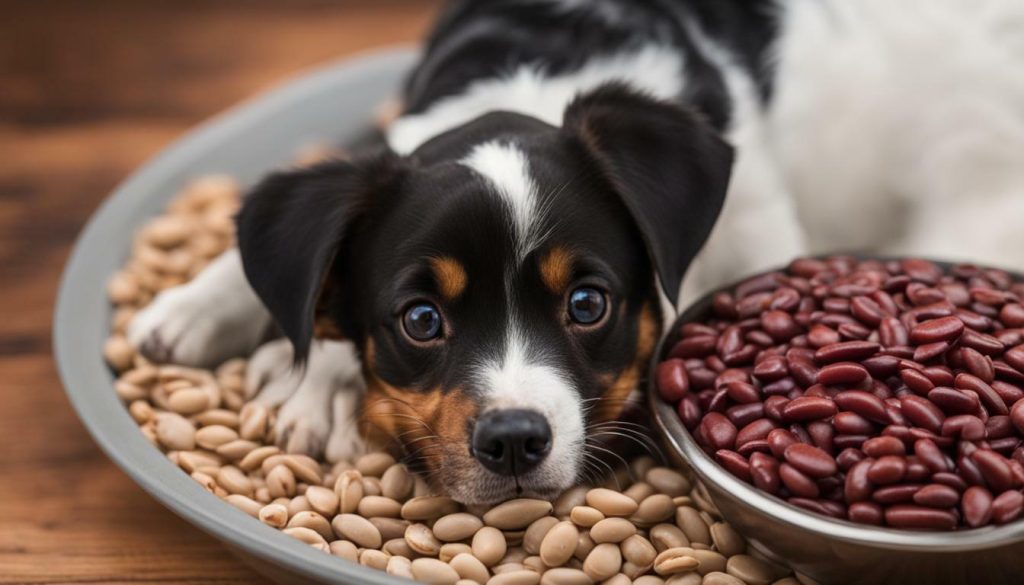
Consult with Your Veterinarian
As with any dietary changes for your dog, it’s always best to consult with your trusted veterinarian beforehand. While black beans can be safe for dogs to eat, it is important to understand the proper preparation and moderation required to ensure your pet’s health and safety.
Before adding black beans to your dog’s diet, schedule a visit with your veterinarian to discuss their specific nutritional needs and any potential risks or allergies. Your veterinarian can provide personalized advice based on your dog’s age, breed, weight, and overall health.
During your consultation, your veterinarian can also guide you on the appropriate portion sizes and frequency of feeding black beans to your dog. They can help you determine if black beans are suitable for your dog’s diet, considering any existing medical conditions or dietary restrictions they may have.
Remember, your veterinarian is the best resource for providing expert advice and ensuring the well-being of your furry friend. By consulting with them, you can make informed decisions about your dog’s diet and ensure they receive the appropriate nutrients for optimal health.
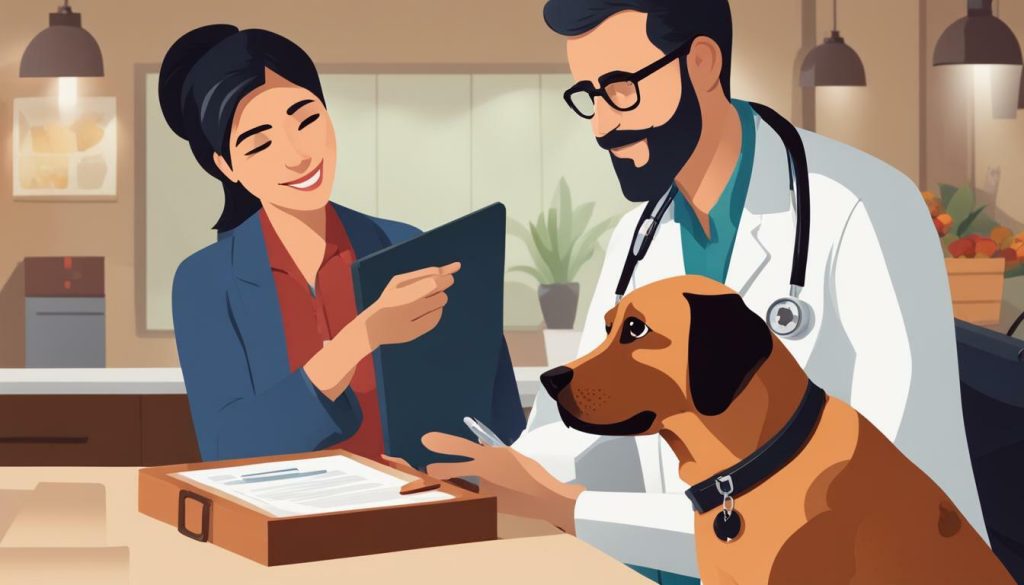
| Benefits of Consulting with Your Veterinarian: |
|---|
| Personalized advice tailored to your dog’s specific needs |
| Identification and management of any potential risks or allergies |
| Guidance on portion sizes and frequency of feeding black beans |
| Consideration of existing medical conditions or dietary restrictions |
| Expert recommendations for your dog’s overall health and well-being |
Conclusion
In conclusion, black beans can be a safe and nutritious addition to your dog’s diet when prepared and served properly. They offer a range of benefits, including protein, fiber, and antioxidants, which can contribute to your dog’s overall health and well-being. However, it is important to note that black beans also contain toxins that can be harmful to dogs if not prepared correctly.
Before feeding black beans to your dog, it is crucial to soak and cook them thoroughly to remove these toxins. This process ensures that your dog can safely digest and benefit from the nutrients in the beans. It is also important to avoid canned black beans as they often contain high levels of sodium, which can be detrimental to your dog’s health.
While black beans can be a suitable option for dogs, there are other beans that are also safe for them to consume. Green beans, lima beans, pinto beans, and chickpeas are all alternative options that can provide similar nutritional benefits to black beans. However, as with any new food, it is always best to consult with your veterinarian before introducing it to your dog’s diet.
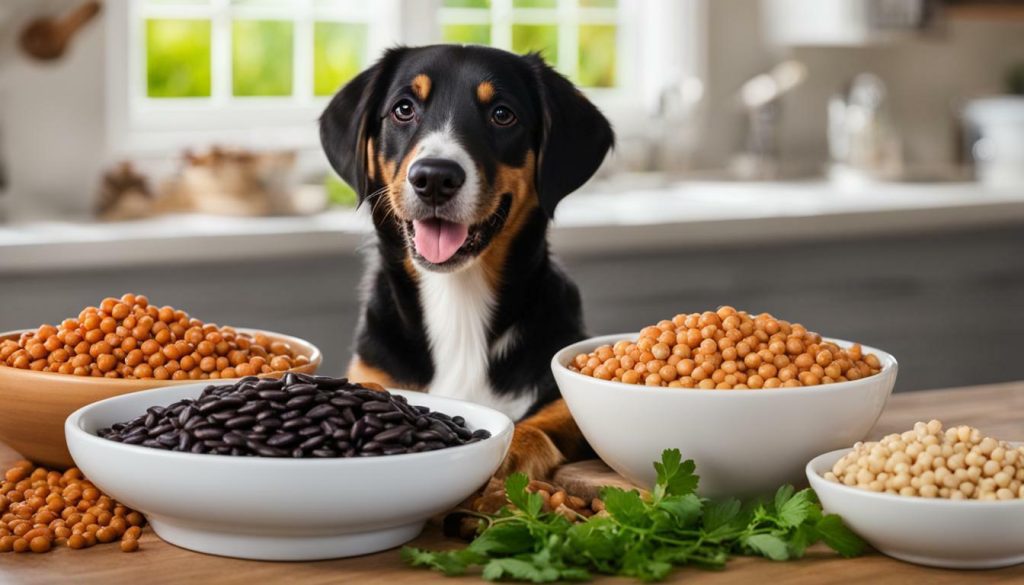
Providing a balanced and varied diet for your dog is essential for their overall health. While black beans can be a part of this diet, it is crucial to exercise moderation and ensure proper preparation. By following these guidelines and seeking professional advice, you can safely incorporate black beans or other suitable beans into your dog’s meals and provide them with a well-rounded nutritional plan.
| Benefits of Black Beans for Dogs | Risks of Black Beans for Dogs |
|---|---|
|
|
Conclusion
In conclusion, black beans can be a safe and nutritious addition to your dog’s diet if prepared and fed properly. They offer a good source of protein, fiber, and antioxidants, which can support your dog’s overall health. However, it is important to note that black beans also contain toxins that can be harmful to dogs if not removed through soaking and cooking.
To properly prepare black beans for your dog, ensure that you soak them overnight and cook them thoroughly until they are soft. This process will help eliminate any toxins that may be present. It is also important to avoid feeding your dog canned black beans due to their high sodium content, which can be harmful to their health.
If you are looking for other safe bean options for your dog, you can consider green beans, lima beans, pinto beans, and chickpeas. These beans offer similar nutritional benefits and can be a healthy addition to your dog’s diet. However, as with any new food, it is always best to consult with your veterinarian before introducing black beans or any other food into your dog’s diet.
Your veterinarian can provide personalized advice based on your dog’s specific needs and dietary requirements. They can also help you determine the appropriate portion sizes and frequency for feeding black beans or other beans to your dog. Remember, moderation is key when it comes to feeding human foods to your furry friend.
FAQ
Can dogs safely eat black beans?
Yes, black beans can be safe for dogs to eat but should be fed in moderation and prepared properly.
What are the benefits of feeding black beans to dogs?
Black beans are a good source of protein, fiber, and antioxidants, which can contribute to a healthy diet for dogs.
How should black beans be prepared for dogs?
Black beans should be soaked and cooked thoroughly before feeding them to your dog to remove any toxins. Canned black beans should be avoided due to their high sodium content.
Can black beans be a source of protein for dogs?
Yes, black beans can provide dogs with a source of protein, which is essential for their overall health and well-being.
What are the potential risks of feeding black beans to dogs?
Black beans contain toxins that can be harmful to dogs, so it is important to feed them in moderation and ensure they are properly prepared.
Are there alternative food options for dogs besides black beans?
Yes, other safe food options for dogs that can provide similar nutritional benefits include green beans, lima beans, pinto beans, and chickpeas.
Can dogs properly digest black beans?
Dogs have the ability to digest black beans, but it is important to prepare them properly to ensure they are easily digestible.
What is the nutritional value of black beans for dogs?
Black beans contain vitamins and minerals that can contribute to a balanced and nutritious diet for dogs.
Are there other safe beans for dogs to eat?
Yes, in addition to black beans, other safe beans for dogs to eat include green beans, lima beans, pinto beans, and chickpeas.
Should I consult with my veterinarian before feeding black beans to my dog?
Yes, it is always best to consult with your veterinarian before adding any new food to your dog’s diet to ensure it is safe and appropriate for their specific needs.

